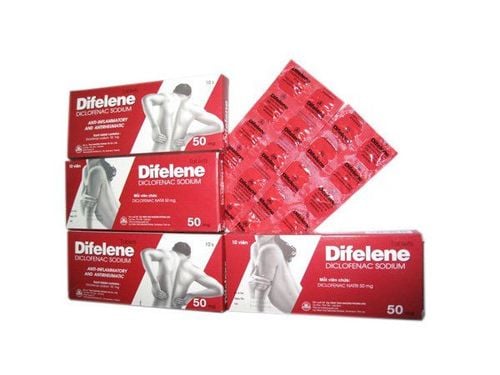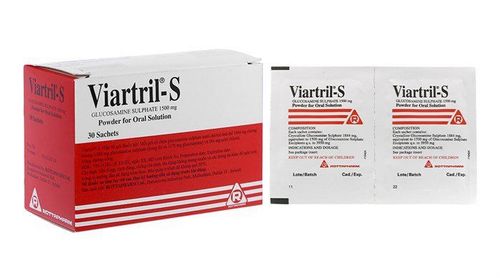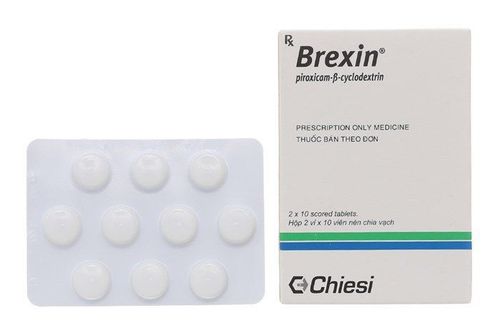Difelene contains the active ingredient sodium diclofenac 50g and excipients, formulated as enteric-coated tablets. The drug is primarily used to treat inflammation, osteoarthritis, rheumatoid arthritis, and more.
1. What does Difelene do?
What conditions does Difelene treat? This drug is used to treat inflammation and various forms of osteoarthritis, rheumatoid arthritis, chronic osteoarthritis, and ankylosing spondylitis. Additionally, it helps relieve pain from inflammation (not caused by rheumatoid arthritis).
Other effects of Difelene that are not listed on the drug label may exist. Your doctor may prescribe this drug for other conditions.
2. Contraindications of Difelene
Certain individuals should not use Difelene, including:
- People who are hypersensitive to sodium diclofenac, any component of Difelene, aspirin, or other nonsteroidal anti-inflammatory drugs;
- Patients with active peptic ulcers;
- People with asthma, bronchospasm, cardiovascular disease, severe liver or kidney disease;
- People taking coumarin anticoagulants;
- People who wear contact lenses;
- Children under 12 years old;
- People with reduced circulating volume due to diuretics or kidney failure, with a glomerular filtration rate below 30 ml/min;
- People with collagen diseases, at risk of aseptic meningitis;
- People with congestive heart failure (stages II-IV), peripheral arterial disease, ischemic heart disease, or cerebrovascular disease.

3. How to use and dose of Difelene
How to use: Take this medicine by mouth with a glass of water, right after meals. To reduce the risk of side effects, use Difelene at the lowest effective dose for the shortest possible time (as directed by your doctor).
This medication is for use by patients aged 12 years and older. Dosage is as follows:
- Osteoarthritis: Take 1 tablet 3 times daily. For long-term treatment, take 1 tablet twice daily.
- Ankylosing spondylitis: Take 1 tablet 2-3 times daily.
- Rheumatoid arthritis: Take 2-4 tablets daily, divided into several doses. Do not exceed 4 tablets (200mg) per day. For long-term treatment, take 2 tablets daily, divided into 2 doses.
- Pain relief: Take 1 tablet 3 times daily.
- Pain relief in cancer patients: Take 2 tablets twice daily.
Note: This dosage information cannot replace the advice of a doctor. Patients should consult their doctor before taking the medication.
In case of overdose, the patient should immediately call the emergency center or go to the nearest medical facility. The doctor may induce vomiting or perform gastric lavage for the patient and combine treatment for overdose symptoms. Afterward, the doctor may give the patient activated charcoal to reduce the absorption of the drug in the gastrointestinal tract and the liver-intestinal cycle.
If you forget a dose, take it as soon as you remember. If it is near the time of the next dose, skip the missed dose and take the next dose at the regular time, do not double the dose.
4. Side effects of Difelene
Patients may experience a number of side effects when using Difelene, including:
- Common: Restlessness, headache, nausea, upper abdominal pain, vomiting, diarrhea, loss of appetite, bloating, indigestion, tinnitus, etc.
- Uncommon: Swelling, allergies (especially bronchospasm in asthmatics), anaphylaxis, rhinitis, urticaria; abdominal pain, gastrointestinal bleeding, peptic ulcer exacerbation; insomnia, irritability, mild hearing impairment, loss of balance, dizziness, vertigo, depression, itching, blurred vision, etc.
- Rare: Edema, rash, hair loss, aseptic meningitis, decreased platelet and white blood cell counts, anemia, neutropenia, eosinophilia; cystitis, hematuria, acute renal failure, nephrotic syndrome, interstitial nephritis; gallbladder dyskinesia, hepatitis, jaundice.
Additionally, some clinical trials and pharmacoepidemiological studies have shown an association between the use of this drug and an increased risk of thromboembolic events (heart attack or stroke), especially with high doses and long-term use.

5. Precautions when using Difelene in special cases
For individuals in special circumstances (pregnancy, breastfeeding, etc.), caution should be exercised when using Difelene:
- Pregnant women: Difelene should not be used during pregnancy, especially in the last trimester as it can inhibit uterine contractions, increase irreversible systemic blood pressure, and potentially cause kidney failure in the fetus.
- Women planning pregnancy: Difelene should not be used as it can inhibit embryo implantation.
- Breastfeeding women: Difelene should only be used after discontinuing breastfeeding. In other cases, the risks and benefits should be carefully weighed and a doctor consulted.
6. Drug interactions
Difelene can alter the effects of other medications or increase the incidence of side effects. Therefore, to avoid drug interactions, patients should provide their doctor with a list of all medications they are currently taking. Additionally, to ensure safe use of the medication, patients should not self-medicate, stop, or change the dosage without their doctor's permission.
Do not use Difelene in combination with the following medications:
- Oral anticoagulants and heparin: May cause severe bleeding.
- Quinolone antibiotics: May increase the central nervous system side effects, leading to seizures.
- Aspirin or glucocorticoids: These drugs decrease the concentration of diclofenac in the blood plasma and increase the risk of gastrointestinal bleeding.
- Lithium: Diclofenac can increase lithium levels in the blood, leading to toxicity. If the combined use of these two drugs is necessary, the patient should be closely monitored for signs of toxicity and the lithium dose should be adjusted accordingly.
- Diflunisal: If used concomitantly with diclofenac, it can increase the concentration of diclofenac in the plasma, reduce diclofenac clearance, and may cause severe gastrointestinal bleeding.
- Digoxin: Difelene can increase the concentration of digoxin in the blood serum and prolong the half-life of digoxin. Therefore, the doctor needs to measure the concentration of digoxin in the blood and reduce the dose of digoxin if the two drugs are used together.
- Ticlopidine: Concomitant use with diclofenac increases the risk of bleeding.
- Methotrexate: Diclofenac increases the toxicity of methotrexate in the plasma, increasing the risk of toxicity.
- Intrauterine contraceptive devices: There is evidence that using diclofenac can reduce the contraceptive effect.
Difelene can be used concurrently with the following drugs but patients should be closely monitored: Diuretics, antihypertensive drugs, cyclosporine, probenecid, cimetidine, etc.
Difelene should be stored at a temperature not exceeding 30°C, out of the reach of children and pets. When using the drug, patients should strictly follow the doctor's instructions to ensure the effectiveness of the treatment and avoid unpredictable side effects.
To arrange an appointment, please call HOTLINE or make your reservation directly HERE. You may also download the MyVinmec app to schedule appointments faster and manage your reservations more conveniently.








